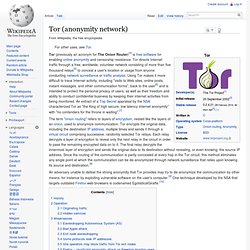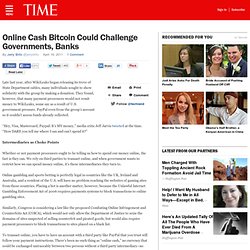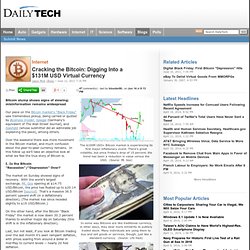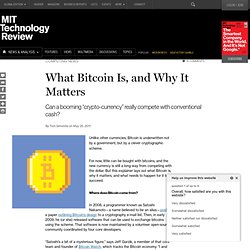

Tor (anonymity network) Tor (previously an acronym for The Onion Router)[4] is free software for enabling online anonymity and censorship resistance.

Tor directs Internet traffic through a free, worldwide, volunteer network consisting of more than five thousand relays[5] to conceal a user's location or usage from anyone conducting network surveillance or traffic analysis. Using Tor makes it more difficult to trace Internet activity, including "visits to Web sites, online posts, instant messages, and other communication forms", back to the user[6] and is intended to protect the personal privacy of users, as well as their freedom and ability to conduct confidential business by keeping their internet activities from being monitored. An extract of a Top Secret appraisal by the NSA characterized Tor as "the King of high secure, low latency Internet anonymity" with "no contenders for the throne in waiting".[7]
Anonymity Online. U.S. Underwrites Internet Detour Around Censors Abroad. The effort includes secretive projects to create independent cellphone networks inside foreign countries, as well as one operation out of a spy novel in a fifth-floor shop on L Street in Washington, where a group of young entrepreneurs who look as if they could be in a garage band are fitting deceptively innocent-looking hardware into a prototype “Internet in a suitcase.”

Financed with a $2 million State Department grant, the suitcase could be secreted across a border and quickly set up to allow wireless communication over a wide area with a link to the global Internet. The American effort, revealed in dozens of interviews, planning documents and classified diplomatic cables obtained by The New York Times, ranges in scale, cost and sophistication. Some projects involve technology that the United States is developing; others pull together tools that have already been created by hackers in a so-called liberation-technology movement sweeping the globe.
The Invisible Web Then there was Mr. Mr. Economics of Bitcoin. The Bitcoin Bubble. My friend Jerry Brito is one of the best-connected and most insightful observers of the Internet I know, so when he starts talking up an Internet trend , I pay attention. But after reading his case for Bitcoin, a new digital currency, I remain a skeptic. The article is worth reading in full, but here’s an important part of his case for Bitcoin: The web has also seen all-purpose digital currencies, from defunct dot-com bubble start-ups Flooz and Beenz, to the slightly more successful e-gold.
Unlike cash, however, digital currencies to date have had a third party intermediary monitoring transactions. That’s because digital cash is different from physical cash in one very important way: If I hand you a 100 euro bill, I no longer have it. Bitcoin is the first online currency to solve the so-called “double spending” problem without resorting to a third-party intermediary.
But dollars have at least two advantages over Bitcoins. Bitcoin’s Collusion Problem. Yesterday I questioned whether we should expect demand for Bitcoins to be stable over the long run.

Today I want to look at the supply side. A constrained supply of money is important to a currency’s stability. One of Bitcoin’s key selling points is that the number of Bitcoins issued will never exceed 21 million. But this promise isn’t credible. To understand why, we need to dig a little bit into how the protocol works. Online Cash Bitcoin Could Challenge Governments, Banks.
Late last year, after WikiLeaks began releasing its trove of State Department cables, many individuals sought to show solidarity with the group by making a donation.

They found, however, that many payment processors would not remit money to WikiLeaks, some say as a result of U.S. government pressure. PayPal even froze the group’s account so it couldn’t access funds already collected. “Hey, Visa, Mastercard, Paypal: It’s MY money,” media critic Jeff Jarvis tweeted at the time. “How DARE you tell me where I can and can’t spend it?” Intermediaries as Choke Points Whether or not payment processors ought to be telling us how to spend our money online, the fact is they can.
Online gambling and sports betting is perfectly legal in countries like the UK, Ireland and Australia, and a resident of the U.S. will have no problem reaching the websites of gaming sites from those countries. True Digital Cash Since the web has been around, digital currencies have come and gone. Cracking the Bitcoin: Digging Into a $131M USD Virtual Currency. The $100M USD+ Bitcoin market is experiencing its first major inflationary event.

There's great volatility, but since Friday's drop of 15 percent, the trend has been a reduction in value versus the USD. (Source: Mt. What Bitcoin Is, and Why It Matters. Unlike other currencies, Bitcoin is underwritten not by a government, but by a clever cryptographic scheme.

For now, little can be bought with bitcoins, and the new currency is still a long way from competing with the dollar. Virtual currency: Bits and bob TheEconomist.